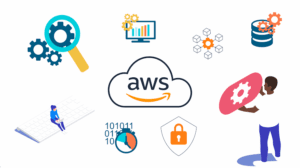AWS (Amazon Web Services) : Comprehensive Overview
Introduction
Amazon Web Services (AWS) has revolutionized the world of cloud computing since its launch in 2006. Offering a wide array of services, AWS empowers businesses to scale efficiently, innovate rapidly, and manage their IT infrastructure cost-effectively. This article delves into the intricate details of AWS, exploring its history, core services, benefits, and use cases.

History and Evolution
Early Beginnings
Amazon initially started as an online bookstore, but Jeff Bezos, its founder, envisioned a company far beyond that scope. In the early 2000s, Amazon faced significant challenges managing its own IT infrastructure. Consequently, the company developed a robust internal system to handle its growing needs, laying the groundwork for AWS.
Launch and Initial Growth
AWS (Amazon Web Services) launched officially in 2006 with services like Amazon S3 (Simple Storage Service) and EC2 (Elastic Compute Cloud). Initially, AWS aimed to offer businesses reliable and scalable computing resources, sparking the cloud revolution. The early success of these services demonstrated the potential of cloud computing, encouraging more companies to adopt the technology.
Expansion and Innovation
Over the years, AWS expanded its portfolio to include databases, machine learning, artificial intelligence, and Internet of Things (IoT) services. The continuous innovation positioned AWS as a leader in the cloud industry. AWS now offers over 200 fully featured services from data centers globally, enabling organizations to leverage cutting-edge technology.
Core Services of AWS
Compute Services
Amazon EC2 (Elastic Compute Cloud)
Amazon EC2 provides resizable compute capacity in the cloud. It allows businesses to launch virtual servers as needed, adjusting capacity quickly to meet changing requirements. EC2 instances offer various configurations, including different operating systems, instance types, and storage options, making it highly versatile.
AWS Lambda
AWS Lambda enables users to run code without provisioning or managing servers. It executes code only when needed and scales automatically, making it ideal for event-driven applications. This serverless computing service helps reduce costs and simplifies the deployment process.
Storage Services
Amazon S3 (Simple Storage Service)
Amazon S3 offers scalable object storage with high durability and availability. Businesses use S3 to store and retrieve any amount of data from anywhere on the web. Its features include versioning, lifecycle policies, and access controls, making it a versatile storage solution.
Amazon EBS (Elastic Block Store)
Amazon EBS provides persistent block storage for EC2 instances. It offers consistent, low-latency performance for applications requiring frequently accessed data. EBS volumes come in various types, each optimized for different use cases such as transactional databases or big data analytics.

Database Services
Amazon RDS (Relational Database Service)
Amazon RDS simplifies the setup, operation, and scaling of relational databases in the cloud. It supports multiple database engines, including MySQL, PostgreSQL, MariaDB, Oracle, and SQL Server. Automated backups, software patching, and high availability configurations enhance reliability.
Amazon DynamoDB
Amazon DynamoDB is a fully managed NoSQL database service. It delivers single-digit millisecond performance at any scale, making it suitable for applications requiring high throughput and low latency. Features like automatic scaling, backup and restore, and in-memory caching enhance its capabilities.
Networking and Content Delivery
Amazon VPC (Virtual Private Cloud)
Amazon VPC allows businesses to provision a logically isolated section of the AWS cloud. It provides complete control over the virtual networking environment, including IP address ranges, subnets, and route tables. VPC enhances security and enables the deployment of applications in a secure environment.
Amazon CloudFront
Amazon CloudFront is a content delivery network (CDN) service that accelerates the delivery of web content to users globally. It integrates seamlessly with other AWS services and provides robust security features, including DDoS protection and SSL/TLS encryption.
Security and Identity
AWS IAM (Identity and Access Management)
AWS IAM enables organizations to manage access to AWS services and resources securely. It allows the creation of users, groups, and roles, and the application of permissions to control access. IAM supports multi-factor authentication (MFA) and integrates with other AWS security services.
AWS KMS (Key Management Service)
AWS KMS provides centralized control over the encryption keys used to protect data. It allows users to create and manage keys and control their use across a wide range of AWS services and applications. KMS integrates with AWS CloudTrail to provide logs of all key usage.
Developer Tools
AWS CodePipeline
AWS CodePipeline automates the release processes for application updates. It builds, tests, and deploys code every time there is a change, based on the release process models defined by the user. This continuous delivery service helps maintain high software release velocity.
AWS CodeBuild
AWS CodeBuild is a fully managed build service that compiles source code, runs tests, and produces software packages ready for deployment. It scales continuously and processes multiple builds concurrently, reducing the wait time for software builds.
Benefits of Using AWS
Scalability and Flexibility
AWS provides unparalleled scalability and flexibility. Businesses can scale their infrastructure up or down based on demand, ensuring optimal resource utilization and cost efficiency. AWS offers a wide variety of instance types and configurations, catering to diverse computing needs.
Cost Management
AWS operates on a pay-as-you-go pricing model, allowing businesses to pay only for the resources they consume. This model eliminates the need for large upfront investments in hardware. Additionally, AWS offers various cost management tools and services, such as AWS Cost Explorer and AWS Budgets, to help businesses monitor and control their spending.
Reliability and Performance
AWS ensures high reliability and performance through its global network of data centers. Services like Amazon EC2 and S3 provide robust performance with minimal downtime. AWS’s architecture is designed for fault tolerance, with features like availability zones and auto-scaling enhancing resilience.
Security
AWS prioritizes security, offering a comprehensive suite of services and tools to protect data and applications. AWS complies with numerous industry standards and certifications, including ISO 27001, SOC 1/2/3, and GDPR. Features like encryption, access controls, and continuous monitoring safeguard sensitive information.
Innovation and Agility
AWS fosters innovation by providing access to cutting-edge technologies such as machine learning, artificial intelligence, and IoT. These services enable businesses to experiment, prototype, and deploy new solutions quickly. AWS’s vast ecosystem of tools and services supports rapid development and deployment cycles, enhancing business agility.
Use Cases of AWS
Web Hosting
AWS offers a robust infrastructure for hosting websites and web applications. Services like Amazon EC2, S3, and CloudFront enable scalable and high-performance hosting solutions. Businesses can easily deploy and manage their web presence, ensuring reliable access and fast load times for users worldwide.
Big Data and Analytics
AWS provides powerful tools for big data and analytics. Services like Amazon Redshift, EMR (Elastic MapReduce), and Kinesis allow organizations to collect, process, and analyze vast amounts of data. These services support real-time analytics, data warehousing, and machine learning, helping businesses derive actionable insights from their data.
Disaster Recovery
AWS offers comprehensive disaster recovery solutions, ensuring business continuity during outages or failures. Services like Amazon RDS, S3, and EC2 support automated backups, replication, and failover capabilities. AWS’s global infrastructure enables geographically distributed backup and recovery options, enhancing resilience.
Machine Learning and AI
AWS facilitates the development and deployment of machine learning and AI applications. Services like Amazon SageMaker, Rekognition, and Comprehend provide powerful tools for building and scaling intelligent applications. These services support various use cases, including image and video analysis, natural language processing, and predictive analytics.
DevOps
AWS supports DevOps practices through a range of tools and services designed to automate and streamline software development and operations. Services like AWS CodePipeline, CodeBuild, and CodeDeploy facilitate continuous integration and continuous delivery (CI/CD). These tools help teams collaborate efficiently, maintain high release velocity, and ensure code quality.
Internet of Things (IoT)
AWS IoT services enable the connection and management of IoT devices at scale. Services like AWS IoT Core, Greengrass, and IoT Analytics provide the infrastructure and tools needed to build and deploy IoT applications. These services support real-time data processing, device management, and analytics, empowering businesses to leverage IoT technology.
Competitive Landscape
Microsoft Azure
Microsoft Azure is a major competitor to AWS, offering a wide range of cloud services. Azure integrates seamlessly with Microsoft’s ecosystem, making it an attractive choice for businesses already using Microsoft products. Azure’s strong hybrid cloud capabilities and extensive enterprise partnerships enhance its competitiveness.
Google Cloud Platform (GCP)
Google Cloud Platform (GCP) competes with AWS by leveraging Google’s expertise in data analytics and machine learning. GCP offers innovative services like BigQuery and TensorFlow, appealing to businesses focused on data-driven applications. GCP’s strong security features and global infrastructure also make it a viable alternative.
IBM Cloud
IBM Cloud provides cloud solutions with a focus on enterprise-grade security and compliance. IBM’s expertise in AI and hybrid cloud capabilities distinguishes it from other providers. Services like Watson AI and Kubernetes-based container solutions attract businesses seeking advanced technology and robust security.
Oracle Cloud
Oracle Cloud targets enterprises with its comprehensive suite of cloud applications and infrastructure services. Oracle’s strong database capabilities and integration with its ERP, HCM, and CRM applications appeal to organizations seeking an all-in-one solution. Oracle Cloud’s autonomous database services offer significant performance and cost advantages.
Future Trends in AWS
Artificial Intelligence and Machine Learning
The future of AWS will see continued investment in AI and machine learning services. AWS will likely introduce more advanced tools and frameworks, making it easier for businesses to build and deploy intelligent applications. Enhanced integration with other AWS services will streamline the development process and drive innovation.
Edge Computing (continued)
Services like AWS Greengrass and AWS IoT are already enabling edge computing capabilities, allowing data processing closer to the source. As the demand for low-latency applications grows, AWS will likely expand its edge computing offerings. This expansion will include enhanced support for IoT devices and more robust edge data processing capabilities, reducing the need to send all data to centralized data centers.
Hybrid Cloud Solutions
Hybrid cloud solutions will become increasingly important, with AWS enhancing its support for on-premises infrastructure integration. Services like AWS Outposts and VMware Cloud on AWS allow businesses to run AWS services in their own data centers, providing a seamless hybrid environment. Future developments will likely focus on improving interoperability, management, and security of hybrid cloud deployments.
Quantum Computing
AWS (Amazon Web services)has already entered the quantum computing space with Amazon Braket, a fully managed service that provides access to quantum computing resources. In the coming years, AWS will likely invest further in quantum computing research and development. This investment will include expanding the capabilities of Amazon Braket and fostering a larger ecosystem of quantum applications and use cases.
Enhanced Security and Compliance
As cyber threats continue to evolve, AWS will place greater emphasis on security and compliance. Future enhancements will include more sophisticated threat detection and response capabilities, improved encryption technologies, and expanded compliance certifications. AWS will also develop more automated security tools to help businesses protect their data and applications more effectively.
Green Cloud Computing
Sustainability will be a key focus area for AWS. The company aims to power its operations with 100% renewable energy by 2025. Future initiatives will likely include developing more energy-efficient data centers, investing in renewable energy projects, and offering services that help customers reduce their carbon footprints. AWS will also provide more tools and metrics to help businesses track and optimize their environmental impact.
Conclusion
AWS(Amazon Web Services) has become a cornerstone of modern IT infrastructure, offering a comprehensive suite of cloud computing services that cater to a wide range of business needs. From compute and storage to databases and machine learning, AWS provides the tools and resources necessary for businesses to innovate, scale, and succeed in a rapidly changing technological landscape.
By continuously evolving and expanding its services, AWS remains at the forefront of the cloud computing industry. Its focus on scalability, cost management, reliability, security, and innovation ensures that AWS will continue to be a vital partner for businesses of all sizes. As new technologies and trends emerge, AWS’s commitment to delivering cutting-edge solutions will enable businesses to stay competitive and thrive in the digital era.
In summary, AWS’s rich history, diverse service offerings, and forward-looking approach make it an indispensable resource for organizations seeking to harness the power of the cloud. Whether it’s deploying a simple web application, analyzing massive datasets, or building advanced AI models, AWS provides the infrastructure and tools necessary to achieve these goals and more.
AWS (Amazon Web Services) : Comprehensive Overview…
